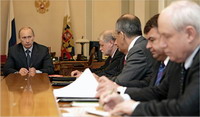Russia asked to reconsider its decision about arms treaty
A trans-Atlantic security organization wants Russia to reconsider its decision to pull out of a key conventional arms treaty.

At the close of a two-day ministerial meeting, the Organization for Security and Cooperation in Europe also named Kazakhstan to be its rotating president in 2010, despite concerns among some members about the former Soviet bloc country's human rights record.
A unilateral Russian pullout from the Conventional Forces in Europe treaty "would only increase the uncertainty that hangs over the European security system," the Spanish presidency of the OSCE said at the end of the meeting.
Russia will suspend its compliance with the treaty as of Dec. 12 as part of a protest against plans for U.S. missile defense installations in eastern Europe. But it said it will continue negotiations to reach a new agreement.
The OSCE said it had made progress in talks on extending the mandate of its mission monitoring human rights in Kosovo, but no final decision had been reached because of uncertainty over the future political status of the ethnic Albanian-majority region of Serbia. Western mediators in talks between the two sides are to report back to the United Nations by Dec. 10.
Outgoing chairman and Spanish Foreign Minister Miguel Angel Moratinos said it would be up to the OSCE's permanent council to decide on an eventual extension but he was optimistic.
"I hope the extension will be approved before Dec. 10 but in any case it must be approved before the end of the year when the mandate expires," said Moratinos.
With Finland already designated as OSCE president in 2008, the Madrid meeting said it had chosen Greece for 2009 and Kazakhstan for 2010. The latter had faced opposition from some members because of its record on democracy, human rights and elections. It was ultimately chosen after pledging to make reforms.
The Kazakhstan decision immediately drew criticism from New York-based Human Rights Watch, which described Kazakhstan as a "classic soft authoritarian state."
"Kazakhstan does not observe OSCE commitments at home, so entrusting it to uphold the organizations human rights commitments as its leader is a singularly bad idea," said Rachel Denber, head of the group's Central Asia research unit.
Moratinos said it would be the first time a former eastern bloc country would hold the presidency.
The Madrid conference started with Russia and the United States mutually accusing each other of trying to manipulate the organization.
The spat started after the body said it would not monitor Russia's legislative elections on Sunday, citing interference from Moscow.
U.S. Undersecretary of State Nicholas Burns accused Russia and several allies of working to weaken the OSCE - particularly its election and human rights monitoring mission - but he maintained that the attack had been successfully fended off.
Russia, meanwhile, wrapped up the conference saying the entire OSCE need a complete overhauling to keep up with a changing Europe.
Subscribe to Pravda.Ru Telegram channel, Facebook, RSS!


